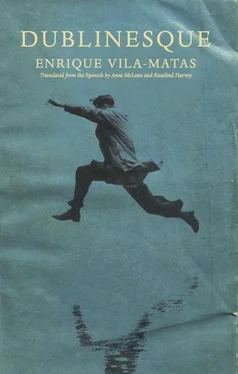What will he do now that he’s discovered that neither God nor the brilliant author exist and that, furthermore, no one looks at him anymore, and on top of that, there is nothing but misery in his ground-level Beckettian world. As he listens to the rain falling, he again senses, realizing that not only has something given way in the room, but also someone has now literally gone. There is no longer a shadow, not a trace of the specter of his author, or of the novice, or of God, or of the New York duende , or of the genius he always sought. It’s only intuition, but it seems clear that, ever since he’s felt settled into the worst of the worst, he’s been heading toward something even lower. No one’s lying in wait for him any longer, no one’s watching him, there isn’t even anyone hidden or invisible behind the deep blue interminable air. No one’s out there. He imagines slipping a smooth watch into his trouser pocket and starting down the stairs of a remote presbytery. But soon he wonders why he is making such an effort to imagine so much if no one, absolutely no one, sees him. Desolation, solitude, misery at the ground level. Settled into the worst of the worst, the world now only resembles a tiny mound of shit in the most rotten, least pure, least fragrant space. Nostalgia for perfumed faces, for apple faces. Things have gotten so bad; perhaps it would be best if Malachy Moore hadn’t died and continued to be a presence — a shadow if you will — that at heart, even if only a shadow, at least he was a presence with some sort of encouraging force.
He knows Malachy Moore was a great walker and that many called him Godot. That he’d been seen all over Dublin, in the most unexpected places. That he had Dracula’s great ability of turning himself into fog. He doesn’t know much else, but doesn’t think he’s so hard to imagine: Malachy Moore grew in an irregular way, especially his bone structure. Everyone was immediately struck by his eyes. Although he was short-sighted, his eyes were sharp and expressive, and gleamed with the profound light of intelligence behind the round lenses of his glasses. His hands were cold and lifeless and he never gave a firm handshake. When he roamed the streets, his legs resembled a stiff pair of compasses. He was an absolutely brilliant author, even though he’d never even written anything. He was the author Riba would have liked to discover. He seemed taller than he actually was. And if one caught a glimpse of him up close — before, following his most notorious custom, he disappeared into the fog — one would see straight away that he was not such a tall person, although his stature was above average. The impression of height came from his thin build, his mackintosh all buttoned up, and his tight trousers. Something in his appearance, with the fundamental contribution of his head, reminded one of some highland eagle — watchful, restless — soaring over valleys. A bird to keep an eye on.
Although he’s stuck in his rocking chair, he keeps hearing the gradual and almost irresistible call of his computer and after a while, knowing that Google sometimes works just like a police file, he gives in to temptation and goes and sits in front of the screen, like a perfect hikikomori , trying to discover in the entries on Malachy Moore, the young man in the mackintosh he saw in Glasnevin who made him think he might be looking at his author.
He looks at the entries, but only finds information on baseball or soccer players of that name, none of whom could ever be the genius in the raincoat he thought he saw a few weeks ago. He clicks on Images to see if by chance anyone pops up resembling a young Beckett, but there’s nothing of the sort, although there is a photo of three gentlemen, the caption of which has nothing at all to do with anyone called Malachy Moore: Sean McBride, Minister of External Affairs Irish Republic, Bernard Deeny, and Malachy McGrady at the 1950 Aeridheacht .
In order to carry on doing something before his two sleeping pills kick in, he checks the word Malachy, without the Moore, and there he finds information about an honorable Irishman, St. Malachy, a character completely unknown to him, but whom he has the impression he’s heard spoken of a thousand times. He reads about this St. Malachy of Armagh of Ireland, who was born Maelmhaedhoc O’Morgair in the year 1094 and was a Catholic archbishop, who is remembered ten centuries later for the two prophecies supposedly revealed to him at the end of a pilgrimage to Rome.
St. Malachy’s prophecies take Riba to Benedictus, the mysterious current Pope. And looking up the latest news on him, he discovers that Benedictus alias Ratzinger is a pope who spends most of his time in his room, reading and writing and preparing encyclicals. He travels much less than his energetic predecessor. As they used to say John Paul’s apartment looked like a Polish tabernacle, because there were always people coming in and out, they say the papal apartment of Benedictus/Ratzinger resembles a vault, that it’s reminiscent of the room in which the poet Hölderlin shut himself up for forty years. Why that room specifically? He tries to find out, unsuccessfully, to whom it would have occurred to link Ratzinger with the sublime Hölderlin. And he ends up thinking of Hölderlin’s room in Tübingen, that room lent to him by the carpenter Zimmer and in which the poet lived for forty years. He thinks of The Invention of Solitude by Paul Auster, where it’s said that Hölderlin’s madness was faked and that the poet retired from the world in response to the ridiculous political attitude that racked Germany after the French Revolution. According to this, Hölderlin’s most deranged texts had been written in a secret, revolutionary code, and furthermore, with the private joy of a confined man.
“Confining oneself to a room. .” he remembers Paul Auster wrote.
He thinks how someone who could observe him from outside would see him. Someone like Malachy Moore, for example, who has now died. No one was ever able to prove that the dead can’t see us. . A great clap of thunder. . Again, he feels entirely awake. A shame, now that he was starting to enter into a restorative dream, a dream that would take place entirely on Hopper’s stairway.
Mixed with fear, his yawns are imaginative curves taken by a slow, imaginary racing car that sometimes speeds up suddenly. On one of these curves, at the wheel of this strange car, he’s just discovered that his personality has things in common with that of Simon of the Desert, that anchorite who spent his life on top of a pillar in a Buñuel film. Simon stood in penance on top of the eight-meter-high pillar, while he has been doing the same, for a while now, with a more modern touch: sitting in front of a computer and with the feeling that the more time he spends in front of the screen, the more the computer, in a very Kafkaesque way, is imprinting itself on his body.
He suddenly realizes — no one is safe from the racing car’s whims — that a crippled dwarf and his goats are surrounding him. The devil appears to him dressed as a woman and tries to tempt him. Suddenly the feminine demon, as if in an imitation of what happened to Simon of the Desert, takes him on a trip — swifter than swift — to a cabaret in New York, and he’s glad to have arrived in that city so quickly, and what’s more, to have been unexpectedly liberated from the Gutenberg galaxy and the digital galaxy, both at once. It’s as if he’d approached the world beyond them, which can be nothing but the final cataclysm. After all, as John Cheever said: “We are never in our own times, we’re always somewhere else.”
In the cabaret, the voice of Frank Sinatra rings out at a thousand revolutions per minute, a song with lyrics that, depending on how you look at it, are terrible: “The best is yet to come.”
Читать дальше












